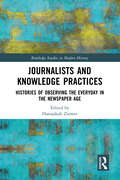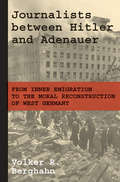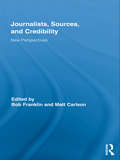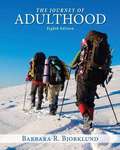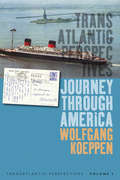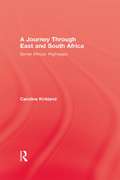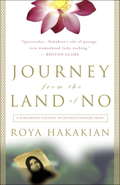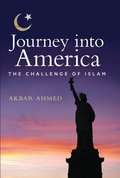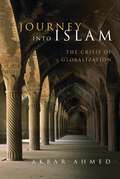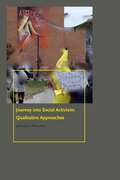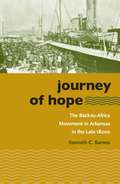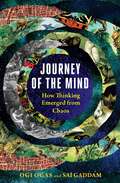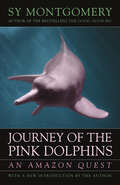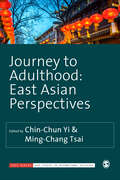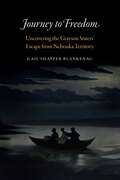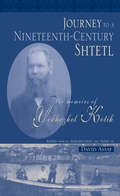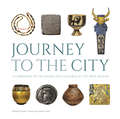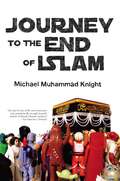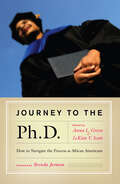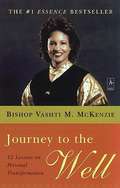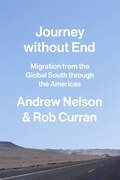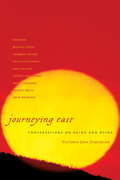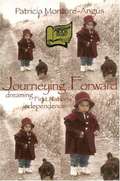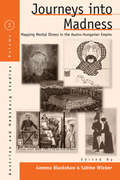- Table View
- List View
Journalists and Knowledge Practices: Histories of Observing the Everyday in the Newspaper Age (Routledge Studies in Modern History)
by Hansjakob ZiemerThis multi-disciplinary anthology provides new perspectives on the journalist’s role in knowledge generation in the newspaper age—covering diverse topics from fake news to new technologies. Fake news, journalistic authority, and the introduction of cutting-edge technologies are often viewed as new topics in journalism. However, these issues were prevalent long before the twenty-first century. Connecting for the first time two burgeoning strands of research—a newly perceived history of knowledge and the study of journalism—Journalists and Knowledge Practices provides insights into the journalist’s role in the world of knowledge in the newspaper age (ca. 1860s to 1970s). This multi-disciplinary anthology asks how journalists conducted their work and reconstructs histories of journalistic practices in specific regional constellations in Europe and North America. From fake news writing to inventing psychological concepts, integrating electric telegrams to fabricating photographs, explaining pandemics to creating communities, these case studies written by distinguished scholars from various disciplines in the humanities show how notions of fact and truth were shaped, new technologies integrated, and knowledge transfers arranged. This book is crucial reading for scholars and students interested in the historically changing relationships between journalistic practices and the generation and dissemination of knowledge. This volume is crucial reading for scholars and students interested in the history of journalistic practice.
Journalists between Hitler and Adenauer: From Inner Emigration to the Moral Reconstruction of West Germany
by Volker R. BerghahnThe moral and political role of German journalists before, during, and after the Nazi dictatorshipJournalists between Hitler and Adenauer takes an in-depth look at German journalism from the late Weimar period through the postwar decades. Illuminating the roles played by journalists in the media metropolis of Hamburg, Volker Berghahn focuses on the lives and work of three remarkable individuals: Marion Countess Dönhoff, distinguished editor of Die Zeit; Paul Sethe, “the grand old man of West German journalism”; and Hans Zehrer, editor in chief of Die Welt.All born before 1914, Dönhoff, Sethe, and Zehrer witnessed the Weimar Republic’s end and opposed Hitler. When the latter seized power in 1933, they were, like their fellow Germans, confronted with the difficult choice of entering exile, becoming part of the active resistance, or joining the Nazi Party. Instead, they followed a fourth path—“inner emigration”—psychologically distancing themselves from the regime, their writing falling into a gray zone between grudging collaboration and active resistance. During the war, Dönhoff and Sethe had links to the 1944 conspiracy to kill Hitler, while Zehrer remained out of sight on a North Sea island. In the decades after 1945, all three became major figures in the West German media. Berghahn considers how these journalists and those who chose inner emigration interpreted Germany’s horrific past and how they helped to morally and politically shape the reconstruction of the country.With fresh archival materials, Journalists between Hitler and Adenauer sheds essential light on the influential position of the German media in the mid-twentieth century and raises questions about modern journalism that remain topical today.
Journalists, Sources, and Credibility: New Perspectives (Routledge Research in Journalism)
by Bob FranklinThis volume revisits what we know about the relationship between journalists and their sources. By asking new questions, employing novel methodologies, and confronting sweeping changes to journalism and media, the contributors reinvigorate the conversation about who gets to speak through the news. It challenges established thinking about how journalists use sources, how sources influence journalists, and how these patterns relate to the power to represent the world to news audiences. Useful to both newcomers and scholars familiar with the topic, the chapters bring together leading journalism scholars from across the globe. Through a variety of methods, including surveys, interviews, content analysis, case studies and newsroom observations, the chapters shed light on attitudes and practices in the United States, United Kingdom, Germany, Australia, Sweden, Belgium and Israel. Special attention is paid to the changing context of newswork. Shrinking newsgathering resources coupled with a growth in public relations activities have altered the source-journalist dynamic in recent years. At the same time, the rise of networked digital technologies has altered the barriers between journalists and news consumers, leading to unique forms of news with different approaches to sourcing. As the media world continues to change, this volume offers a timely reevaluation of news sources.
Journey Of Adulthood
by Barbara R. BjorklundJourney of Adulthood, 8/e by Barbara R. Bjorklund discusses the aspects of “successful aging,” covering growth and development from emerging adulthood to old age. The author combines new and classic research as well as first person experience of adult development. This title helps students understand the development of adults as they leave adolescence and move through their adult years until the end of life. Comprised of both large longitudinal studies and major theories of adult development as well as smaller studies of diverse groups, students will see the influences of gender, culture, ethnicity, race, and socioeconomics background on this journey.
Journey Through America
by Michael Kimmage Wolfgang KoeppenAmerikafahrt by Wolfgang Koeppen is a masterpiece of observation, analysis, and writing, based on his 1958 trip to the United States. A major twentieth-century German writer, Koeppen presents a vivid and fascinating portrait of the US in the late 1950s: its major cities, its literary culture, its troubled race relations, its multi-culturalism and its vast loneliness, a motif drawn, in part, from Kafka's Amerika. A modernist travelogue, the text employs symbol, myth, and image, as if Koeppen sought to answer de Tocqueville's questions in the manner of Joyce and Kafka. Journey through America is also a meditation on America, intended for a German audience and mindful of the destiny of postwar Europe under many Americanizing influences.
Journey Through East And South
by KirklandOriginally published in 1908, Two American Women Journey Through East and South Africa desribes a trip made by two American women to Uganda and the Transvaal in the hopes of inspiring other Americans to do the same.
Journey from the Land of No: A Girlhood Caught in Revolutionary Iran
by Roya Hakakian"We stormed every classroom, inscribed our slogans on the blackboard . . . Never had mayhem brought more peace. All our lives we had been taught the virtues of behaving, and now we were discovering the importance of misbehaving. Too much fear had tainted our days. Too many afternoons had passed in silence, listening to a fanatic's diatribes. We were rebelling because we were not evil, we had not sinned, and we knew nothing of the apocalypse. . . . This was 1979, the year that showed us we could make our own destinies. We were rebelling because rebelling was all we could do to quell the rage in our teenage veins. Together as girls we found the courage we had been told was not in us." In Journey from the Land of No Roya Hakakian recalls her childhood and adolescence in pre-revolutionary Iran with candor and verve. The result is a beautifully written coming-of-age story about one deeply intelligent and perceptive girl's attempt to find an authentic voice of her own at a time of cultural closing and repression. Remarkably, she manages to re-create a time and place dominated by religious fanaticism, violence, and fear with an open heart and often with great humor. Hakakian was twelve years old in 1979 when the revolution swept through Tehran. The daughter of an esteemed poet, she grew up in a household that hummed with intellectual life. Family gatherings were punctuated by witty, satirical exchanges and spontaneous recitations of poetry. But the Hakakians were also part of the very small Jewish population in Iran who witnessed the iron fist of the Islamic fundamentalists increasingly tightening its grip. It is with the innocent confusion of youth that Roya describes her discovery of a swastika--"a plus sign gone awry, a dark reptile with four hungry claws"--painted on the wall near her home. As a schoolgirl she watched as friends accused of reading blasphemous books were escorted from class by Islamic Society guards, never to return. Only much later did Roya learn that she was spared a similar fate because her teacher admired her writing. Hakakian relates in the most poignant, and at times painful, ways what life was like for women after the country fell into the hands of Islamic fundamentalists who had declared an insidious war against them, but we see it all through the eyes of a strong, youthful optimist who somehow came up in the world believing that she was different, knowing she was special. At her loneliest, Roya discovers the consolations of writing while sitting on the rooftop of her house late at night. There, "pen in hand, I led my own chorus of words, with a melody of my own making." And she discovers the craft that would ultimately enable her to find her own voice and become her own person. A wonderfully evocative story, Journey from the Land of No reveals an Iran most readers have not encountered and marks the debut of a stunning new talent.
Journey into America: The Challenge of Islam
by Akbar AhmedFollowing up on his 2007 work, Journey into Islam: The Crisis of Globalization, in which he traveled the Islamic world with a team of researchers to investigate the diversity of Muslim societies abroad, Ahmed (Islamic studies, American U. in Washington, D. C.) here reports on a similar project in which he traveled through Muslim communities across the United States administering questionnaires and conducting interviews in order to explore social patterns and attitudes of American Muslims in the context of the broader history of American racial and religious relations. He begins with an ethnographic discussion of American identity in general before turning to an examination of the ethnography of Islam in America, within which he offers separate discussions of African American Muslims, Muslim immigrants, and white and Latino Muslim converts. He also includes chapters comparing the American experiences of Muslims to that of Jews and Mormons. Annotation ©2010 Book News, Inc., Portland, OR (booknews.com)
Journey into Islam: The Crisis of Globalization
by Akbar AhmedGlobalization, the war on terror, and Islamic fundamentalism-followed closely by a rise in Islamophobia-have escalated tensions between Western nations and the Muslim world. Yet internationally renowned Islamic scholar Akbar Ahmed believes that through dialogue and understanding, these cultures can coexist peacefully and respectfully. That hope and belief result in an extraordinary journey. To learn what Muslims think and how they really view America, Ahmed traveled to the three major regions of the Muslim world the Middle East, South Asia, and East Asia. Journey into Islam: The Crisis of Globalization is the riveting story of his search for common ground. His absorbing narrative and personal photos bring the reader on a tour of Islam and its peoples. Ahmed sought to understand the experiences and perceptions of ordinary Muslims. Visiting mosques, madrassahs, and universities, he met with people ranging from Pakastan President Pervez Musharraf to prime ministers, princes, sheikhs, professors, and students. He observed, listened, and asked them questions. For example, who inspires them? What are they reading? How do the Internet and international media impact their lives? How do they view America, the West, and changes in society? Ahmed's anthropological expedition enjoyed extensive access to women and youths, revealing unique information on large yet often misunderstood populations. Lamentably, he found high levels of anti-Americanism and anti-Semitism and a widespread perception that Islam is under attack from the West. But he also brought back reason for hope. He returned from his groundbreaking travels both impressed with the concerned, kind nature of the individuals he encountered and invigorated with the vitality and passion they displayed. Journey into Islam makes a powerful plea for forming friendships across religion, race, and tradition to create lasting peace between Islam and the West.
Journey into Social Activism: Qualitative Approaches (Donald McGannon Communication Research Center's Everett C. Parker Book Series)
by Joshua D. AtkinsonAcademic study of social activism and social movements has become increasingly prevalent over the years; this is due in large part to the fact that activists have captured public imagination and gained substantial influence in political discourse. For instance, Occupy Wall Street activists, Tea Party activists, and activists affiliated with the Arab Spring have transformed political debates and have become the focus of mainstream news media coverage about a variety of different political topics.Journey into Social Activism explicates the philosophical foundations of the study of activism and illustrates four different research sites in which activism can be observed and studied: organizations, networks, events, and alternative media. The book will introduce students and scholars to important qualitative approaches to the study of social activism within these four research sites, which is based entirely on successful research projects that have been conducted and published in recent years. Ultimately, this book will prove integral to any students and scholars who wish to use qualitative methods for their research endeavors concerning socialactivism in contemporary society.
Journey of Hope
by Kenneth C. BarnesLiberia was founded by the American Colonization Society (ACS) in the 1820s as an African refuge for free blacks and liberated American slaves. While interest in African migration waned after the Civil War, it roared back in the late nineteenth century with the rise of Jim Crow segregation and disfranchisement throughout the South. The back-to-Africa movement held great new appeal to the South's most marginalized citizens, rural African Americans. Nowhere was this interest in Liberia emigration greater than in Arkansas. More emigrants to Liberia left from Arkansas than any other state in the 1880s and 1890s.In Journey of Hope, Kenneth C. Barnes explains why so many black Arkansas sharecroppers dreamed of Africa and how their dreams of Liberia differed from the reality. This rich narrative also examines the role of poor black farmers in the creation of a black nationalist identity and the importance of the symbolism of an ancestral continent.Based on letters to the ACS and interviews of descendants of the emigrants in war-torn Liberia, this study captures the life of black sharecroppers in the late 1800s and their dreams of escaping to Africa.
Journey of the Mind: How Thinking Emerged from Chaos
by Sai Gaddam Ogi OgasTwo neuroscientists reveal why consciousness exists and how it works by examining eighteen increasingly intelligent minds, from microbes to humankind—and beyond. Why do you exist? How did atoms and molecules transform into sentient creatures that experience longing, regret, compassion, and even marvel at their own existence? What does it truly mean to have a mind—to think? Science has offered few answers to these existential questions until now. Journey of the Mind is the first book to offer a unified account of the mind that explains how consciousness, language, self-awareness, and civilization arose incrementally out of chaos. The journey begins three billion years ago with the emergence of the universe’s simplest possible mind. From there, the book explores the nanoscopic archaeon, whose thinking machinery consists of a handful of molecules, then advances through amoebas, worms, frogs, birds, monkeys, and humans, explaining what each “new” mind could do that previous minds could not. Though they admire the triumph of human consciousness, Ogi Ogas and Sai Gaddam argue that humans are hardly the most sophisticated minds on the planet. The same physical principles that produce human self-awareness are leading cities and nation-states to develop “superminds,” and perhaps planting the seeds for even higher forms of consciousness. Written in lively, accessible language accompanied by vivid illustrations, Journey of the Mind is a mind-bending work of popular science, the first general book to share the cutting-edge mathematical basis for consciousness, language, and the self. It shows how a “unified theory of the mind” can explain the mind’s greatest mysteries—and offer clues about the ultimate fate of all minds in the universe.
Journey of the Pink Dolphins: An Amazon Quest
by Sy MontgomeryBy the acclaimed author of The Soul of an Octopus and the bestselling memoir The Good Good Pig.When Sy Montgomery ventured into the Amazon to unlock the mysteries of the littleknown pink dolphins, she found ancient whales that plied the Amazon River at dawn and dusk, swam through treetops in flooded forests, and performed underwater ballets with their flexible bodies. But she soon found out that to know the botos, as the dolphins are locally called, you must also know the people who live among them.And so in Journey of the Pink Dolphins, Montgomery—part naturalist, part poet, part Indiana Jones—winds her way through watery tributaries and riverside villages, searching for botos and hearing the tales of locals who believe these ethereal dolphins are shape-shifters—creatures that emerge from the water as splendidly dressed men or women only to enchant their human onlookers, capture their souls, and then carry them away to the Encante, an underwater world. Montgomery takes readers on four separate journeys, exploring the river-dwelling dolphins&’ natural history, chronicling their conservation pressures, unraveling their prehistoric roots, and visiting with shamans who delve into the Encante.
Journey to Adulthood: East Asian Perspectives (SAGE Studies in International Sociology)
by Chin-Chun Yi Ming-Chang TsaiYoung people in East Asia are increasingly experiencing a prolonged transition to adulthood. They are spending longer in school, entering the labour market later, and getting married later still. This protracted young adulthood interacts with forces of both tradition and modernization, as social and economic changes generate profound effects on the transition from school to work, on family formation, on personal relationships, and on subjective well-being. Journey to Adulthood explores the special characteristics of young adulthood in East Asia. It uses Taiwan as illustrative example, with comparative findings from its East Asian neighbours Japan, Korea and Hong Kong. It describes the particular growth context of a millennial generation, and the challenges they face as they attempt to balance family formation, personal development and entry into a market economy. Edited by Chin-Chun Yi and Ming-Chang Tsai, this collection helps us to understand the structural configurations East Asian young adults collectively represent. Taking a cross-cultural and comparative perspective, it enables meaningful policy suggestions on family dynamics, educational strategy, and health and well-being across the globe. Dr Chin-Chun Yi and Dr Ming-Chang Tsai both work within the Institute of Sociology, Research Center for Humanities and Social Sciences, Academia Sinica, Taiwan
Journey to Adulthood: East Asian Perspectives (SAGE Studies in International Sociology)
by Chin-Chun Yi Ming-Chang TsaiYoung people in East Asia are increasingly experiencing a prolonged transition to adulthood. They are spending longer in school, entering the labour market later, and getting married later still. This protracted young adulthood interacts with forces of both tradition and modernization, as social and economic changes generate profound effects on the transition from school to work, on family formation, on personal relationships, and on subjective well-being. Journey to Adulthood explores the special characteristics of young adulthood in East Asia. It uses Taiwan as illustrative example, with comparative findings from its East Asian neighbours Japan, Korea and Hong Kong. It describes the particular growth context of a millennial generation, and the challenges they face as they attempt to balance family formation, personal development and entry into a market economy. Edited by Chin-Chun Yi and Ming-Chang Tsai, this collection helps us to understand the structural configurations East Asian young adults collectively represent. Taking a cross-cultural and comparative perspective, it enables meaningful policy suggestions on family dynamics, educational strategy, and health and well-being across the globe. Dr Chin-Chun Yi and Dr Ming-Chang Tsai both work within the Institute of Sociology, Research Center for Humanities and Social Sciences, Academia Sinica, Taiwan
Journey to Freedom: Uncovering the Grayson Sisters' Escape from Nebraska Territory
by Gail Shaffer BlankenauIn late November of 1858 two enslaved Black women—Celia Grayson, age twenty-two, and Eliza Grayson, age twenty—escaped the Stephen F. Nuckolls household in southeastern Nebraska. John Williamson, a man of African American and Cherokee descent from Iowa, guided them through the dark to the Missouri River, where they boarded a skiff and crossed the icy waters, heading for their first stop on the Underground Railroad at Civil Bend, Iowa. In Journey to Freedom Gail Shaffer Blankenau provides the first detailed history of Black enslavement in Nebraska Territory and the escape of these two enslaved Black women from Nebraska City. Poised on the &“frontier,&” the Graysons&’ escape demonstrated that unique opportunities beckoned at the confluence of Nebraska, Missouri, Iowa, and Kansas, and their actions challenged slavery&’s tentative expansion into the West and its eventual demise in an era of territorial fluidity. Their escape and the violence that followed prompted considerable debate across the country and led to the Nebraska legislature&’s move to prohibit slavery. Drawing on multiple collections, records, and slave narratives, Journey to Freedom sheds light on the Graysons&’ courage and agency as they became high-profile figures in the national debate between proslavery and antislavery factions in the antebellum period.
Journey to a Nineteenth-Century Shtetl: The Memoirs of Yekhezkel Kotik
by David AssafThe first annotated English edition of a classic early-twentieth-century Yiddish memoir that vividly describes Jewish life in a small Eastern European town.
Journey to the City: A Companion to the Middle East Galleries at the Penn Museum
by Steve Tinney Karen SonikThe Penn Museum has a long and storied history of research and archaeological exploration in the ancient Middle East. This book highlights this rich depth of knowledge while also serving as a companion volume to the Museum's signature Middle East Galleries opening in April 2018. This edited volume includes chapters and integrated short, focused pieces from Museum curators and staff actively involved in the detailed planning of the new galleries. In addition to highlighting the most remarkable and interesting objects in the Museum's extraordinary Middle East collections, this volume illuminates the primary themes within these galleries (make, settle, connect, organize, and believe) and provides a larger context within which to understand them.The ancient Middle East is home to the first urban settlements in human history, dating to the fourth millennium BCE; therefore, tracing this move toward city life figures prominently in the book. The topic of urbanization, how it came about and how these early steps still impact our daily lives, is explored from regional and localized perspectives, bringing us from Mesopotamia (Ur, Uruk, and Nippur) to Islamic and Persianate cites (Rayy and Isfahan) and, finally, connecting back to life in modern Philadelphia. Through examination of topics such as landscape, resources, trade, religious belief and burial practices, daily life, and nomads, this very important human journey is investigated both broadly and with specific case studies.
Journey to the End of Islam
by Michael Muhammad KnightIn Journey to the End of Islam, Michael Muhammad Knight whose work has led to him is hailed as both the Jack Kerouac and Hunter S. Thompson of American Islam wanders through Muslim countries, navigating between conflicting visions of his religion.
Journey to the Ph.D.: How to Navigate the Process as African Americans
by Anna L. Green LeKitaV. ScottAs a new generation of African Americans completes college, an increasing number of students are aspiring to the Ph.D. as a stepping stone to a career in the academy and to fully participate in shaping our society. Most African Americans are conscious that they are the first in their families to embark on this journey. They are aware they will meet barriers and prejudice, are likely to face isolation and frustration, and find few sources of support along the way.This book, by twenty-four Black scholars who “have been there,” offers a guide to aspiring doctoral students to the formal process and to the personal, emotional and intellectual challenges they are likely to face. The authors come from a wide range of disciplines – from computing, education and literature to science and sociology. Although their experiences and backgrounds are as varied as they are as individuals, their richly diverse chapters cohere into a rounded guide to the issues for those who follow in their footsteps.From questioning the reader about his or her reasons for pursuing a doctorate, offering advice on financial issues, the choice of university and doctoral program, and relocation, through the process and timetable of application, interviews, acceptance and rejection, the authors go on to describe their own journeys and the lessons they have learned.These men and women write candidly about their experiences, the strategies they used to maintain their motivation, make the transition from HBCUs to PWIs, balance family and work, make the right choices and keep focussed on priorities. They discuss how to work effectively with advisors and mentors, make all-important connections with teachers and build professional and personal support networks. They recount how they dealt with tokenism, established credibility, handled racism, maintained their values and culture, and persuaded supervisors to legitimize their research interests in African American issues. This is both an inspirational and practical book for every African American considering pursuit of a doctoral degree.
Journey to the Well
by Mckenzie Vashti M.In the tradition of empowering spiritual writers such as Ilanya Vanzant, Bishop Vashti McKenzie offers women a Christian path to personal transformation. A groundbreaking preacher who, in 2000, became the first woman to serve as bishop in the African Methodist Episcopal Church, Bishop McKenzie is renowned for her eloquence and passion in the pulpit. Now she brings her inspirational message to readers through the biblical story of the meeting at the well between Jesus and the Samaritan woman. In twelve lessons, McKenzie interweaves the Samaritan woman's experiences with contemporary personal stories, Bible quotations, life-affirming sayings, and meditational activities. Through them she shows women that if they hold onto hope and listen for their moments of epiphany, they can accomplish anything.
Journey without End: Migration from the Global South through the Americas
by Andrew Nelson Rob CurranJourney without End chronicles the years-long journey of "extracontinentales"—African and South Asian migrants moving through Latin America toward the United States. Based on five years of collaborative research between a journalist and an anthropologist, this book makes an engrossing, sometimes surreal, narrative-driven critique of how state-level immigration policy fails extracontinental migrants.The book begins with Kidane, an Eritrean migrant who has left his pregnant wife behind to make the four-year trip to North America; it then picks up the natural disaster–riddled voyage of Roshan and Kamala Dhakal from Nepal to Ecuador; and it continues to the trials of Cameroonian exile Jane Mtebe, who becomes trapped in a bizarre beachside resort town on the edge of the Darién Gap—the gateway from South to Central America.Journey without End follows these migrants as their fitful voyages put them in a semi-permanent state of legal and existential liminality. Mercurial policy creates profit opportunities that transform migration bottlenecks—Quito's tourist district, a Colombian beachside resort, Panama's Darién Gap, and a Mexican border town—into spontaneous migration-oriented spaces rife with racial, gender, and class exploitation. Throughout this struggle, migrant solidarity allows for occasional glimpses of subaltern cosmopolitanism and the possibility of mobile futures.
Journeying East
by Victoria DimidjianSome of the West's foremost spiritual teachers share their thoughts on aging and the end of life process. Comprehensive and original interviews with Ram Dass, Michael Eigen, Norman Fischer, Joan Halifax, Thich Nhat Hanh, Sister Ch,n KhÙng, Frank Ostaseski, Rodney Smith, and John Wellwood provide new perspectives and offer comfort and support. This accessible, thought-provoking, and unique book is an invaluable resource for individuals, classrooms, hospice or home care settings, and for anyone who has experienced the loss of a loved one.Journeying East also features a comprehensive resources section with an annotated bibliography, guidelines for general reading and study, information on the training of hospice employees and volunteers, and suggested at-home activities.Victoria Jean Dimidjian is professor of education at Florida Gulf Coast University. She began her study of Buddhism at the Zen Studies Society in Manhattan in 1974 and is a founding member of the Naples Community of Mindfulness."An important and life-changing book." --Diane Cox, CEO, Hospice of Naples, FL
Journeying Forward: Dreaming First Nations' Independence
by Patricia Monture-AngusQuestioning the ability of political organizations to assist in fully eradicating the oppression of First Nations and their citizens, the author critically reflects on the meaning of "self-government"—and the obstacles as well as solutions to some of its challenges. Concluding that self-government as a goal is too narrow and overly inundated by colonial meanings to be a full solution, Monture-Angus rejects the idea of "self-government" in favor of a much larger idea, independence.
Journeys Into Madness: Mapping Mental Illness in the Austro-Hungarian Empire (Austrian and Habsburg Studies #14)
by Gemma Blackshaw Sabine WieberAt the turn of the century, Sigmund Freud's investigation of the mind represented a particular journey into mental illness, but it was not the only exploration of this 'territory' in the Austro-Hungarian Empire. Sanatoriums were the new tourism destinations, psychiatrists were collecting art works produced by patients and writers were developing innovative literary techniques to convey a character's interior life. This collection of essays uses the framework of journeys in order to highlight the diverse artistic, cultural and medical responses to a peculiarly Viennese anxiety about the madness of modern times. The travellers of these journeys vary from patients to doctors, artists to writers, architects to composers and royalty to tourists; in engaging with their histories, the contributors reveal the different ways in which madness was experienced and represented in 'Vienna 1900'.
